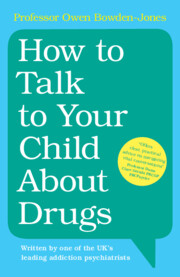Book contents
- How to Talk to Your Child About Drugs
- How to Talk to Your Child About Drugs
- Copyright page
- Contents
- Acknowledgements
- Introduction
- 1 What Are Psychoactive Drugs, Who Uses Them and Why?
- 2 Understanding Adolescence
- 3 Having the Drug Conversation with Your Child
- 4 Drugs and the Brain
- 5 How Do Drugs Cause Harm?
- 6 Types of Drugs
- 7 Rise of the Synthetics
- 8 Legal but Harmful: Prescription Medications, Tobacco, Vaping and Alcohol
- 9 Behavioural Addictions
- 10 Detecting Drug Use and What to Do about It
- 11 Treatment and Recovery
- 12 Final Thoughts
- Useful Resources
- References
- Index
5 - How Do Drugs Cause Harm?
Published online by Cambridge University Press: 13 February 2025
- How to Talk to Your Child About Drugs
- How to Talk to Your Child About Drugs
- Copyright page
- Contents
- Acknowledgements
- Introduction
- 1 What Are Psychoactive Drugs, Who Uses Them and Why?
- 2 Understanding Adolescence
- 3 Having the Drug Conversation with Your Child
- 4 Drugs and the Brain
- 5 How Do Drugs Cause Harm?
- 6 Types of Drugs
- 7 Rise of the Synthetics
- 8 Legal but Harmful: Prescription Medications, Tobacco, Vaping and Alcohol
- 9 Behavioural Addictions
- 10 Detecting Drug Use and What to Do about It
- 11 Treatment and Recovery
- 12 Final Thoughts
- Useful Resources
- References
- Index
Summary
Psychoactive drug use can cause physical, psychological and social harm.
Drug-related harm depends on factors related to the drug and factors related to the person taking the drug.
Drug-related factors include the type of drug, how it is used, the amount taken and the length of use.
Person-related factors include genetic make-up as well as mental, physical and social health.
Drug use can be broadly classified as recreational use, harmful use or dependence.
For some people, the risk of drug dependence results from faulty brain functioning.
Understanding patterns of harm helps clinicians decide if treatment is needed and, if so, which treatment is most likely to help.
Some behaviour, such as gambling, can cause brain changes similar to those seen in drug dependence.
- Type
- Chapter
- Information
- How to Talk to Your Child About Drugs , pp. 72 - 97Publisher: Cambridge University PressPrint publication year: 2025

